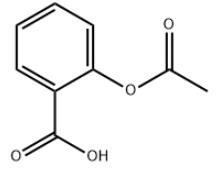Factory Provide High Purity Acetylsalicylic Acid CAS 50-78-2 99% Aspirin Powder

Introduction
Product Name :Acetylsalicylic Acid
Othe name :O-ACETOXYBENZOIC ACID;2-Acetoxybenzoesre,Aspirin
CAS No. 50-78-2
EINECS No. 200-064-1
Molecular Formula: C9H8O4

MW:180.16
Assay: 99%
Appearance: White powder
Melting Point :134-136 °C (lit.)
Boiling Point :272.96°C (rough estimate)
Density :1.35 g/cm3(Predicted)
Storage :Keep in a cool, dry, dark location
Aspirin, also known as acetylsalicylic acid, belongs to non-steroidal anti-inflammatory drugs and was first used for anti-inflammatory and analgesia. Aspirin was later discovered to prevent platelets from clumping together to achieve the antithrombotic effect. As research on aspirin continues, many new uses have been discovered, such as reducing deaths from heart attacks and strokes, and reducing the risk of colorectal cancer.
Function
Aspirin is odorless or slightly acetic acid odor, slightly soluble in water, easily soluble in ethanol, soluble in ether and chloroform, and its aqueous solution is acidic. This product is a derivative of salicylic acid. After nearly a hundred years of clinical application, it has been proved that it has a good effect on relieving mild or moderate pain, such as toothache, headache, neuralgia, muscle pain and dysmenorrhea. It is also used for colds, flu, etc. Relieving fever of febrile diseases, treating rheumatism and so on. In recent years, it has been found that aspirin has an inhibitory effect on platelet aggregation and can prevent thrombosis. It is clinically used to prevent transient ischemic attack, myocardial infarction, artificial heart valve and venous fistula or other postoperative thrombosis.
Application of Aspirin
1. Pain
In general, aspirin works well for dull, throbbing pain; it is ineffective for pain caused by most muscle cramps, bloating, gastric distension, and acute skin irritation
2. Headache
Aspirin is a first-line drug in the treatment of migraine, bringing relief in 50-60% of the cases.
3. Prevention of heart attacks and stroke
There are two distinct uses of aspirin for prophylaxis of cardiovascular events: primary prevention and secondary prevention. Primary prevention is about decreasing strokes and heart attacks in the general population of those who have no diagnosed heart or vascular problems. Secondary prevention concerns patients with known cardiovascular disease.
4. Coronary and carotid arteries, bypasses and stents
The coronary arteries supply blood to the heart. Aspirin is recommended for one to six months after placement of stents in the coronary arteries and for years after a coronary artery bypass graft.
